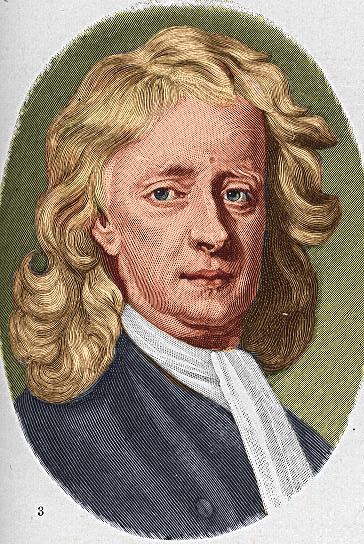
Sir Isaac Newton, the famous seventeenth-century mathematician and scientist, though not generally known as an alchemist, practiced the art with a passion. Though he wrote over a million words on the subject, after his death in 1727, the Royal Society deemed that they were "not fit to be printed." The papers were rediscovered in the middle of the twentieth century and most scholars now concede that Newton was first an foremost an alchemist. It is also becoming obvious that the inspiration for Newton's laws of light and theory of gravity came from his alchemical work.
If one looks carefully, in the light of alchemical knowledge, at the definitive biography, Sir Isaac Newton by J. W. V. Sullivan, it is quite easy to realize the alchemical theories from which he was working. Sir Arthur Eddington, in reviewing this book, says: "The science in which Newton seems to have been chiefly interested, and on which he spent most of his time was alchemy. He read widely and made innumerable experiments, entirely without fruit so far as we know." One of his servants records: "He very rarely went to bed until two or three of the clock, sometimes not till five or six, lying about four or five hours, especially at springtime or autumn, at which time he used to employ about six weeks in his laboratory, the fire scarce going out night or day. What his aim might be I was unable to penetrate into." The answer is that Newton's experiments were concerned with nothing more or less than alchemy. (from Alchemy Rediscovered and Restored by A. Cockren)
As a practicing alchemist, Newton spent days locked up in his laboratory, and not a few have suggested that he finally succeeded in transmuting lead into gold. Perhaps that explains one of the oddest things about his life. At the height of his career, instead of accepting a professorship at Cambridge, he was appointed Director of the Mint with the responsibility of securing and accounting for England's repository of gold.
In fact, Newton -- the revered founder of modern science and the mechanistic universe -- also ranks as one of the greatest spiritual alchemists of all time. In his The Religion of Isaac Newton (Oxford 1974), F.E. Manuel concluded: "The more Newton's theological and alchemical, chronological and mythological work is examined as a whole corpus, set by the side of his science, the more apparent it becomes that in his moments of grandeur he saw himself as the last of the interpreters of God's will in actions, living on the fulfillment of times."
Newton on Keeping Alchemy Secret
Isaac Newton wrote fellow alchemist Robert Boyle a letter urging him to keep "high silence" in publicly discussing the principles of alchemy. "Because the way by the Mercurial principle may be impregnated has been thought fit to be concealed by others that have know it," Newton wrote, "and therefore may possibly be an inlet to something more noble that is not to be communicated without immense damage to the world if there be any verity in [the warning of the] Hermetic writers. There are other things besides the transmutation of metals which none but they understand." According to B.J.T. Dobbs in The Foundations of Newton's Alchemy (Cambridge University Press, 1984), "The fact that Newton never published a work on alchemy cannot be taken to mean that he knew he had failed [at the Great Work]. On the contrary, it probably means that he had enough success to think that he might be on the track of something of fundamental importance and so had good reason for keeping his 'high silence,' even though there is nothing to indicate that he himself was searching for that mysterious "inlet to something more noble."
Comments
Post a Comment